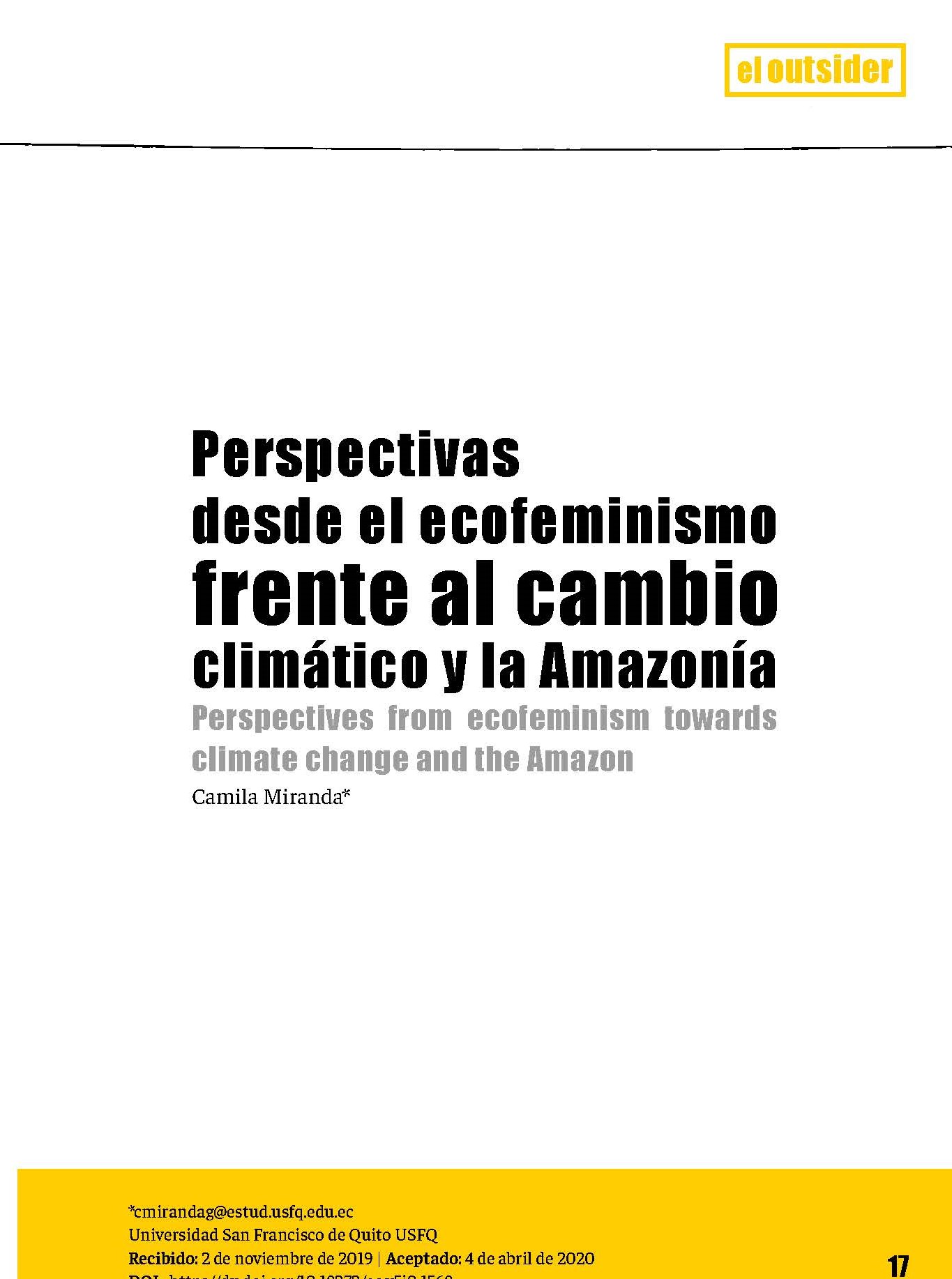Perspectives from ecofeminism towards climate change and the Amazon
Main Article Content
Abstract
Undoubtedly, climate change has become one of the greatest challenges of our era. Following the inclusion of opposing characters such as Greta Thunberg and Jair Bolsonaro in the environmental scene, the debate on the current socio-ecological crisis has taken on new nuances. In turn, spaces such as the Amazon have brought to the fore the voices that a visibly state-centric discipline with a strong imperial baggage, such as International Relations, has silenced. Unlike those hegemonic discourses based on entropocentric and positivist assumptions, according to ecofeminism, the environmental crisis has its origin in certain processes of domination that have oppressed women, underprivileged social groups and nature. Thus, integrating processes of domination such as colonialism and patriarchy into discussions on the environment becomes imperative in order to confront this type of dominant approaches. Thus, the purpose of this reflection is to glimpse, from a gender perspective, those hegemonic discourses, structures and practices that have made nature and women a subalternized other.
Article Details
References
Beck Roger, Linda Black, Larry Krieger, Phillip Naylor y Dahia Ibo Shabaka. 2009. World History: Patterns of Interaction. United States: McDougal Littell.
Chakra Borty, Arpita. 2017. “Can Postcolonial Feminism Revive International Relations?” Economic and Political Weekly 52, no. 20 (mayo): 51-57.
Espinosa, Carlos. 2019. “La nueva derecha extermina la Amazonía”. 4Pelagatos, agosto 26, 2019. https://4pelagatos.com/2019/08/26/la-nueva-derecha-extermina-la-amazonia/
Herrero, Amaranta. 2018. “Ecofeminismos: apuntes sobre la dominación gemela de mujeres y naturaleza”. Ecología Política, no. 54 (enero). https://www.ecologiapolitica.info/?p=10136
Intergovernmental Panel on Climate Change. 2018. “Global Warming of 1.5°C”. Recuperado el 20 de octubre de 2019. https://www.ipcc.ch/sr15/
Larrère, Catherine. 2012. “L’écoféminisme: féminisme écologique ou écologie féministe”. Tracés: Revue de Sciences Humaines, no. 22: 105-121.
Lugones, María. 2010. “Toward a Decolonial Feminism”. Hypatia 25, no. 4: 742-759.
Malchow, LeRoy. 2015. History and International Relations. Edición Kindle: Bloomsbury.
Mies, Maria y Vandana Shiva. Ecofeminismo. Barcelona: Icaria Editorial, 2014.
Mignolo, Walter. 2009. “El lado más oscuro del Renacimiento”. Universitas Humanística 67, no. 67 (enero-junio): 165-203. https://revistas.javeriana.edu.co/index.php/univhumanistica/article/view/2135
Nogales, Helena Katherina. 2018. “Colonialidad de la naturaleza y de la mujer frente a un planeta que se agota”. Ecología Política, no. 54 (enero). https://www.ecologiapolitica.info/?p=10128
Picq, Manuela. 2016. “Rethinking IR from the Amazon”. Revista Brasileira de Política Internacional 59, no. 2 (abril): 1-17. http://dx.doi.org/10.1590/0034-7329201600203
Robinson, Andy. 2019. “El marxismo cultural tiene la culpa de todo”. Nueva Sociedad, septiembre 18, 2019. https://www.nuso.org/articulo/araujo-carvalho-bolsonaro-marxismo-ideologia-extrema-derecha/
Slater, Candace. 2002. Entangled Edens: Visions of the Amazon. Berkeley: University of California Press.
Tickner, Ann. 2014. A feminist voyage through international relations. Nueva York: Oxford University Press.
Tickner, Arlene y David L., Blaney. 2012. Thinking International Relations Differently. New York: Routledge.
Trevilla, Diana. 2018. “Ecofeminismos y agroecología en diálogo para la defensa de la vida”. Revista La Agroecóloga, septiembre 4.
Zaragocin, Sofía. 2018. La Geopolítica del Útero: hacia una geopolítica feminista decolonial en espacios de muerte lenta. En Cruz, D y Bayon, M. (Eds.), Cuerpos, territorios y feminismos. Quito: AbyaYala y Estudios Ecologistas del Tercer Mundo.

